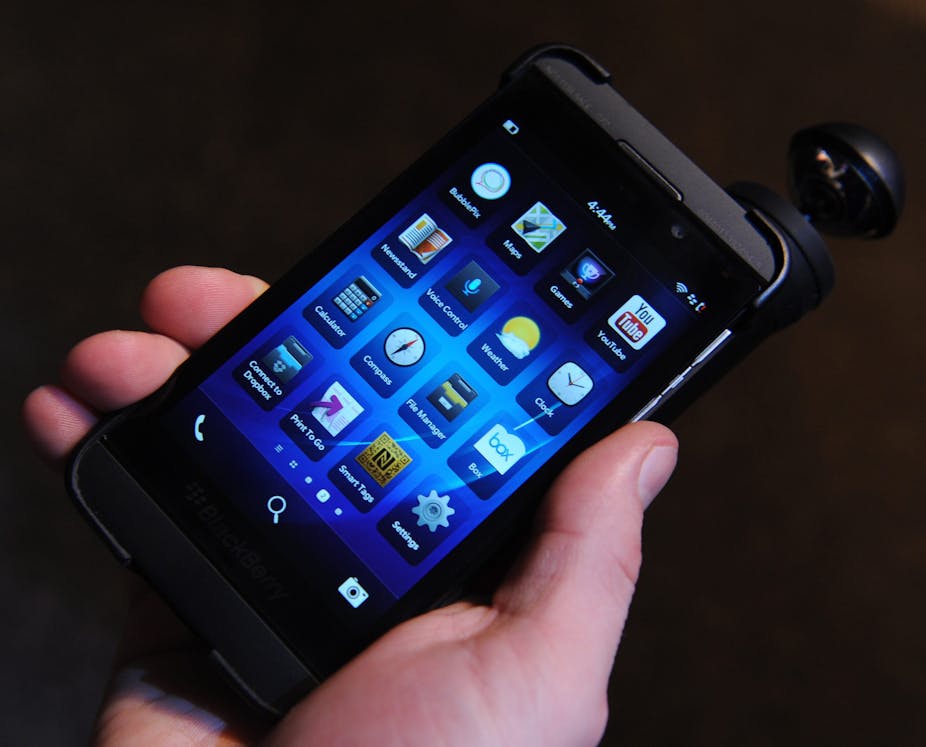Research In Motion (RIM), who as of this week officially changed its name to BlackBerry, has come a long way since its beginnings in Waterloo, Canada in 1984. Started by two engineering students, Mike Lazaridis and Douglas Fregin, the company initially concentrated on consulting and setting up wireless point-of-sale equipment. In 1992, Jim Balsillie joined the company as it was creating two-way wireless paging, a precursor of what would become BlackBerry Messaging. The first BlackBerry device providing email and two-way paging was introduced in 1998, the year after the company had listed on the Toronto Stock Exchange. By 2007, the company was worth $68 billion and became Canada’s most valuable company.
And then along came Apple and Google.
In the US, BlackBerry fell from 44% of the market in 2009 to less than 10% in 2012. Its stock price has fallen from a high of $144 in 2008 to around $13 today. Worldwide, RIM shipped less than 4.6% of all smartphones.
BlackBerry achieved its popularity because, at the time, it offered businesses a secure way of giving their staff access to email. The characteristic BlackBerry keyboard provided an efficient means of navigating and dealing with email. Compared to other phones on the market, especially the clunky Windows-based phones of the time, the BlackBerry was far better. More importantly, it was a phone that corporate IT departments liked. BlackBerry’s rise to prominence was during a period when decisions about corporate mobile platforms were still exclusively a decision made by the IT crowd. Users had no say, but generally didn’t complain because there was clearly nothing better.
But then things changed. Apple and Google caught up and surpassed BlackBerry in providing tools to keep the IT department happy. This allowed the IT departments to give their staff, usually led by the executives, the ability to use their own devices at work, increasingly iPhones and Android smartphones. By comparison, the BlackBerry began to be seen as being outdated and even “embarrassing” to own.
Of course, as with Nokia and Microsoft, RIM has sought to reinvent its phones based on a new operating system. The new OS, BlackBerry 10, was launched this week alongside two new phones the Z10 and Q10. Reviews of the phones and the OS have been largely positive, highlighting innovative features such as the use of gestures to navigate between applications, preview email and enage with social media. But universally, and almost without exception, the opinion has been that it is too little, too late. There is also the stigma of BlackBerry. If it is now becoming “uncool” to own an iPhone, this is nothing compared to how uncool BlackBerry is perceived to be. BlackBerry was never really a consumer-oriented phone even in its heyday, and it is consumers — not businesses — that make up the largest portion of the smartphone market now.
Other than providing yet another option for a smartphone that is not Apple, Android or Windows or from brand loyalty, there is no compelling reason for anyone to choose a BlackBerry. RIM/BlackBerry has done well to convince the number of application developers it has to port their applications to the new platform — offering cash incentives helped. However, there will only be a fraction of the applications that are available for iOS and Android.
The story of RIM is another object lesson of a company and its leaders who refused to acknowledge that their success could be fleeting and who ignored competitive threats until it was too late. Even recently, European managing director Stephen Bates refused to mention or discuss the iPhone when pressed by the interviewer. All questions about how BlackBerry 10 compared to the iPhone were simply ignored. It was almost like there had been an edict from the CEO banning any mention of Apple or Samsung under the threat of some extreme penalty!
The launch of BlackBerry 10 may slow BlackBerry’s decline into irrelevance, but BlackBerry’s final destination is still the same.

